TRURO — The Wampanoag Nation Singers and Dancers performed here on Aug. 5 in front of a crowd that included the market’s usual Monday shoppers along with Mass. Dept. of Agricultural Resources Commissioner Ashley Randle. The event was organized to celebrate both the national and state farmers market weeks.
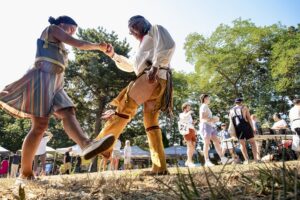
“We are not going to perform for you — we are going to perform with you,” said Kitty Hendricks-Miller, education coordinator for the Mashpee Wampanoag. She led the songs and dances at the weekly Truro Educational Farmers’ Market in collaboration with three other tribe members: her older sister, Carol Hendricks Wynne, Michelle St. John, and Russell Peters.
“This is our summer stomping ground,” Hendricks-Miller told the crowd between dances. “The blueberries, we would have sun-dried those. The pumpkins, we would have cut them into rings and hung them like people do apple rings.”
Doing this, Hendricks-Miller said, meant that the tribe had “wonderful medicine” to sustain it along with deer meat through the winter.
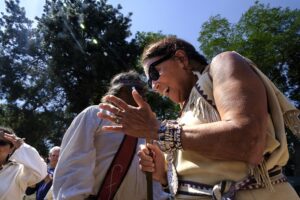
The day was organized with Sustainable CAPE founding director Francie Randolph, who said the idea of using food as medicine underscored the aim of its Fruit & Vegetable Prescription program, where patients at risk of chronic disease can get an Outer Cape Health Services doctor’s prescription for weekly produce until December this year.
“These ideas have been around for a long time, but we’ve sort of gotten away from them,” said Randolph.
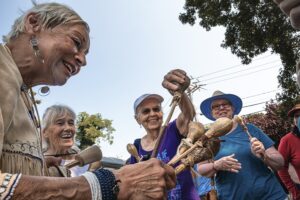
Community Benefits
Truro was one of four stops Randle, a fifth-generation dairy farmer, is making for Mass. Farmers Market Week, which until Aug. 10 celebrates the more than 220 summer and fall farmers markets throughout the state.
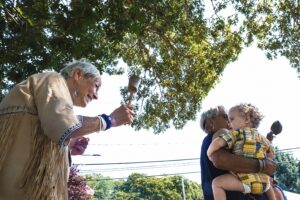
After a challenging growing season last year, Randle said, the tour gives her an opportunity to check in with farmers directly and find out more about the effects of ongoing concerns like climate change.
“Many of these farmers depend on the farmers markets to create that initial sale or transaction or conversation that they then hope sustains beyond the market,” said Randle.
For David Rai, who has run a stand at the Truro market since 2015 and operates Down Home Farm in Truro with his parents, these connections have fueled his family’s business.
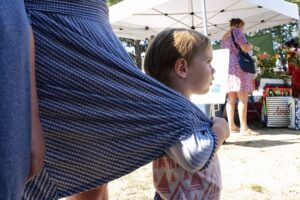
“That’s how we got to this point,” said Rai, who moved to the U.S. with his mother, Digree, from Nepal in 2011, joining his father, Bhala, in Truro. “When we first came, we didn’t know what we could grow around here, so we got a lot of ideas from other people and learned what grows well here and what doesn’t. We’ve become close with many people, starting from the market.”
“It’s always really wonderful to see my hometown not only leading the way here on Cape Cod but really leading the Commonwealth,” said Truro native and state Sen. Julian Cyr, who attended the event, which also saw guests coming from the Mass. Food System Collaborative and Outer Cape Health.
Wampanoag Dancing
The Wampanoag Nation performed for around an hour, with dances including those honoring the mosquito and alligator and the eastern blanket dance, which illustrates the different phases of a woman’s life and how a blanket figures in them. The men also performed the calumet, which honors the pipe ceremony by imitating a pipe and the shape of its smoke.
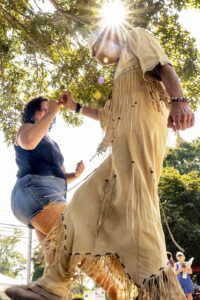
For the last dance, the stomp dance, everyone who wanted one got a rattle, and a group of around 30 danced from under the shade of a tree to a patch of sunshine, coming together one final time in a vibrating and joyous heap.
“We do this to maintain our presence and let people know we’re still here,” said Russell Peters.

“As Americans, this is our root culture, and it is very important to see where we come from,” said Zachary Blandford, who was visiting the Outer Cape from Florida. He danced with his niece, Sofi Yin Blandford, joining generations of dancers and watchers around the tree, from infants to octogenarians.



